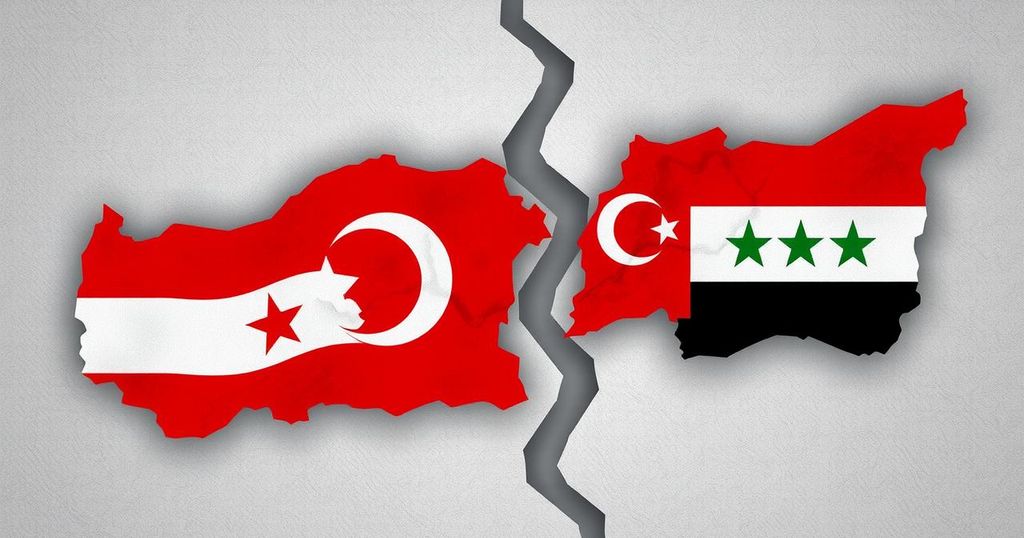Turkey Promises Support to Syria in State Restructuring and Constitution Drafting

Turkish President Recep Tayyip Erdogan declared that Turkey will assist Syria in rebuilding its state and drafting a new constitution. This collaboration involves key Syrian figures and aims to establish an inclusive political framework post-Assad. Erdogan highlighted the importance of reconstruction for the return of Syrian refugees and reaffirmed Turkey’s commitment to security and support in various sectors.
On Friday, Turkish President Recep Tayyip Erdogan announced that Turkey would assist the new Syrian administration in Damascus with restructuring the state and drafting a new constitution. Erdogan emphasized the significance of this initiative as vital for the future of Syria, following the removal of its long-time president, Bashar al-Assad. The Turkish leader indicated that Ankara is already engaged with key figures, including Hay’at Tahrir al-Sham leader Ahmed al-Sharaa, to develop this constitution, which he deemed a crucial step towards establishing an inclusive political framework for Syria.
Erdogan conveyed to reporters during his recent trip to Cairo that Turkey would share its experiences to aid the emerging Syrian administration. He underlined the importance of creating a comprehensive constitution and a political system that would effectively define Syria’s future direction. Moreover, Erdogan disclosed that Sharaa, known by his nom de guerre Abu Mohammed Jolani, expressed Syria’s desire to cultivate strategic relations with Turkey, hinting at the deepening cooperation between the two parties despite Turkey’s ambiguous stance toward HTS.
The Turkish President further assured that Turkey would support Syria in various areas including energy, humanitarian aid, and infrastructure reconstruction, particularly after enduring years of conflict. He stated that a visit to the region by Foreign Minister Hakan Fidan is imminent, aiming to collaborate on establishing the new governmental structure. Erdogan recognized that reconstruction is essential for the repatriation of nearly three million Syrian refugees currently residing in Turkey, while also highlighting the necessity of alleviating international sanctions against Syria, which were imposed during Assad’s regime.
Additionally, Erdogan articulated a commitment to address security concerns related to Kurdish separatist groups along Turkey’s southern borders. He referred to the ongoing efforts to combat terrorist organizations, specifically mentioning the Kurdistan Workers’ Party (PKK) and its Syrian affiliates, asserting that Turkey views the US-backed Syrian Democratic Forces (SDF) as an entity linked to the PKK. He confidently proclaimed, “The end of the road is in sight for the terrorist organisations,” reflecting Turkey’s resolve in this matter.
The framework of governance in Syria has been in turmoil since the civil war, which led to the ousting of many longstanding political figures, including Bashar al-Assad, in December. In this context, Turkey, actively involved in regional dynamics, seeks to influence the restructuring of the Syrian state and the establishment of a new constitution, particularly in collaboration with emerging political entities like Hay’at Tahrir al-Sham. The announcement by Erdogan reinforces Turkey’s strategic emphasis on shaping Syria’s future due to the considerable influx of Syrian refugees into Turkey and the heightened security threats posed by Kurdish groups.
In conclusion, Turkey’s commitment to aiding Syria in its state restructuring and constitutional development underscores Ankara’s strategic objectives in the region. President Erdogan’s announcement reflects a multifaceted approach that intertwines humanitarian support, political stability, and security concerns, particularly regarding Kurdish militant groups. As Turkey navigates these complexities, the prospects for Syrian reconstruction and political restoration remain contingent upon international support and successful collaboration between Turkish officials and Syrian leaders.
Original Source: www.middleeasteye.net








